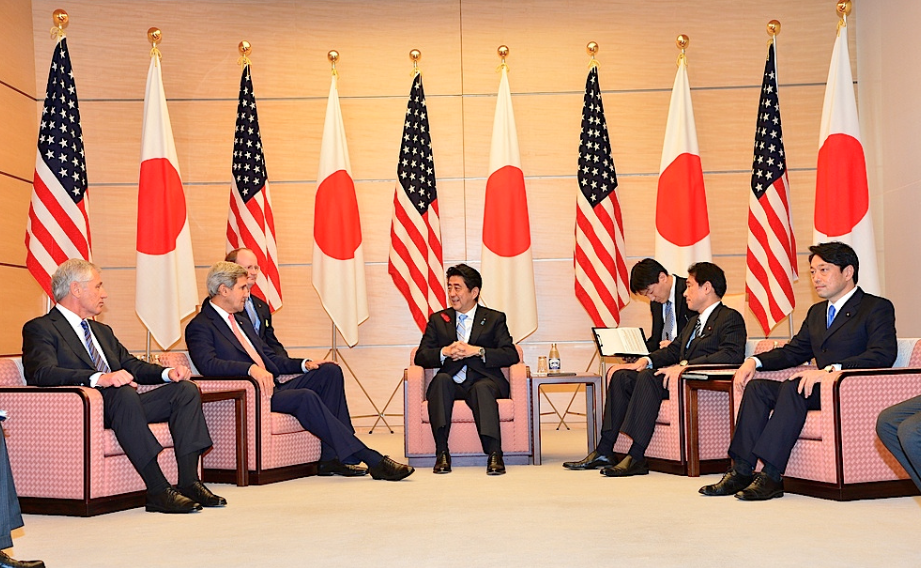I was curious yesterday why CNN and the Wall Street Journal were ostensibly publishing restaurant recommendations when I repeatedly read, “It’s the best sushi I’ve ever had,” in headlines. Reading more closely, I realized that on Wednesday President Obama kicked off his tour of Asia in Tokyo, enjoying sushi at the world famous Sukiyabashi Jiro with Prime Minister Shinzo Abe. In the coming days the president will visit allies Japan, South Korea, and the Philippines as well as prospective ‘strategic partner’ Malaysia, demonstrating his promise to ‘pivot or ‘rebalance’ towards the Asia-Pacific region. The sushi headline is a harbinger of the excessive media scrutiny Obama’s trip promises; there is already a slew of op-eds claiming that the president’s attempt to illustrate his commitment to the region is weak, insincere, and ‘bound to disappoint.’
The president’s ‘pivot,’ did not begin with this week’s tour. As Hillary Clinton published while she served as Secretary of State, throughout his presidency Obama has led a “quiet effort,” to strengthen America’s diplomatic, economic, and strategic ‘long-term investment,’ in the Asia-Pacific region. And it is without question that both sides would benefit from America building its ties in the area. Asia has progressively become key in global politics – it’s the home of half the world’s population, it leads the world in greenhouse gas emissions, and it consists of several “engines of the global economy.” Clinton added that desire for stronger ties is reciprocated by the East: “the region is eager for our leadership and our business … We are the only power with a network of strong alliances in the region, no territorial ambitions, and a long record of providing for the common good.”
To the frustration of the White House, recent headlines illustrate a general lack of confidence in President Obama’s ability to successfully shift his foreign policy and establish the mutually beneficial relationship both Americans and Asians so desire. The administration insists that it has made tangible progress refocusing foreign policy efforts towards Asia in recent years – these efforts have simply been overshadowed by headline grabbing foreign policy events in Iran and Syria. However, Asian as well as American commentators claim that the ‘pivot’ is “hollow,” and under-resourced.
One key aim of beefed up American-Asian diplomatic and economic relations is to counter-balance an increasingly assertive China. Though the White House would be loath to acknowledge this publicly, “the long-term purpose of the “rebalancing” policy in Asia is to contain the more powerful China that seems likely to emerge in the decades to come,” and privately underscoring this to Asian leaders will without doubt be on the president’s itinerary throughout his tour. It is high on America’s list of priorities to prevent China from achieving hegemony in Asia, and such a circumstance is a long way off. Nonetheless, Asian and American commentators have expressed anxiety and skepticism over Obama’s commitment to Japanese and Korean security against China in light of recent events. In the past months, according to the Brookings Institution, China “has pressed its territorial claims in the East and South China seas … including its November declaration of an air defense identification zone in the East China Sea that included the disputed Senkaku Islands administered by Japan (which Beijing claims and calls the Diaoyu) and its efforts to block the resupply of Philippine Marines on the disputed Second Thomas shoal.” Asian interests have cited Obama’s foreign policy in Syria and Crimea as justification for their worry. The president appeared hesitant and passive on Syria after he failed to reinforce his ‘red line,’ and the United States’ inability to quell President Vladimir Putin’s bold expansion into Crimea and Eastern Ukraine, after vehement condemnations and ongoing sanctions, paints the U.S. as unable to enforce the international order.
Though it may tempting to draw a parallel between Russia and China as brash and expanding powers, experts say that worries China will imitate Russia’s action in Ukraine are “overblown.” “The notion that Japanese or Taiwan or American allies in the region are nervous about the U.S. reaction to the Ukraine and that means something for them I think is fundamentally false,” said Jeffrey Bader, a senior fellow at the Brookings Institution and former senior director for East Asian Affairs on the National Security Council. Bader also pointed out the mutual security treaty the United States has maintained with Japan for over five decades, to indicate the fundamentally different circumstances of U.S. interests in East Asia versus East Europe. In the coming days it is inevitable the media will question Obama’s credibility, specifically his ability to prevent an Asian Crimea. Experts, however, have made clear that the parallel between Asia and Eastern Europe are superficial. The Ukraine fell outside of the U.S.’s sphere of influence, but foreign policy precedent and bilateral security deals in Asia assure that the U.S. is committed to a balance of power and stability in the region.
